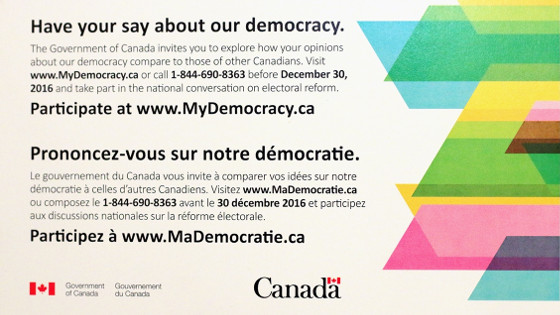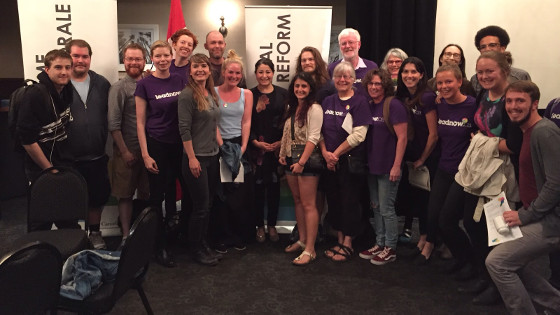2017: Swapping Monsef with Gould
On January 10, 2017, then Minister of Democratic Institutions Maryam Monsef was replaced by Karina Gould. The year prior, she had spoken passionately on the subject of universal suffrage:
It is almost incomprehensible that we could ever exclude a full 50% of society from the franchise, that we could exclude indigenous peoples, ethnocultural minority groups, and those who dared to express different beliefs from those of the government of the day. While I am certainly not proud of the history of disenfranchisement in Canada's electoral history, I am truly proud of how far our democracy has evolved into a more inclusive system for all Canadians.
Electoral reform is the next step in this evolution toward a more inclusive system.
Contrast the 2016 speech with Gould's 2017 interview on CBC's Metro Morning. When asked Why is it important that people at the very least believe every vote counts?
, Gould had the following to say:
Because they do. … We literally count them: 1, 2, 3, 4, up to the majority that wins.
Breaking the Promise
Given this change of tone, it came as no surprise when on February 1st, Gould's new mandate letter was made public.
A clear preference for a new electoral system, let alone a consensus, has not emerged. Furthermore, without a clear preference or a clear question, a referendum would not be in Canada’s interest. Changing the electoral system will not be in your mandate.
e-616
Backing out of this promise resulted in the creation of petition E-616, the largest petition ever on the House of Commons' E-petitions website.
We, the undersigned, supporters of electoral reform, call upon the Government of Canada to immediately declare its on-going commitment to ensuring the 2015 election be the last Federal Canadian election under the First Past The Post system.
My choice to make
The Special Committee found that Trudeau's preferred reform (a non-proportional system) would significantly advantage the Liberal Party and would not be appropriate for Canada.
Contrast how Trudeau spoke of reform before and after this finding.
In order for meaningful electoral reform to take place, a full study of all options needs to be conducted and a consensus needs to be built. To do this properly and with the greatest chance of success, such a study must be undertaken without any preconceived notions of what the best solution would be.
It's not up to any one person, even if it’s the prime minister, to define exactly what that right system is.
It is because I felt that it was not in the best interest of our country or of our future that I turned my back on that promise. And I know people will be disappointed, yep. But this was my choice to make and I chose to make it with full consequence of the cost that is possibly going to come to it.
The Vote
On May 31st, the content of the Special Committee's report, including its recommendation on proportional representation was brought to a vote before the House of Commons.
With only two dissenting MPs, the entire Liberal caucus voted against the motion with all other parties voting in favour of it.
We are committed to ensuring that 2015 will be the last federal election conducted under the first-past-the-post voting system.
Those with disproportate power will never give it up freely. The next step is to get involved. Otherwise, history has a tendency to repeat itself.

